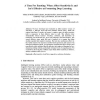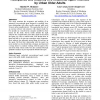35 search results - page 6 / 7 » Fuzzy Similarity of Facial Expressions of Embodied Agents |
ATAL
2008
Springer
13 years 7 months ago
2008
Springer
While talking, people may move heavily their arms around, remain expressionless, or even display subtle facial movements... These differences may arise from personality, cultural,...
HCI
2009
13 years 3 months ago
2009
This paper describes two affect-sensitive variants of an existing intelligent tutoring system called AutoTutor. The new versions of AutoTutor detect learners' boredom, confusi...
ITS
2010
Springer
13 years 7 months ago
2010
Springer
We have developed and evaluated an affect-sensitive version of AutoTutor, a dialogue based ITS that simulates human tutors. While the original AutoTutor is sensitive to learners’...
IVA
2010
Springer
13 years 4 months ago
2010
Springer
Abstract. The human ability to express and recognize emotions plays an important role in face-to-face communication, and as technology advances it will be increasingly important fo...
CHI
2005
ACM
14 years 6 months ago
2005
ACM
This study examines the acceptance and usability of an animated conversational agent designed to establish longterm relationships with older, mostly minority adult users living in...



